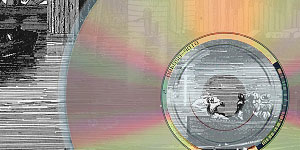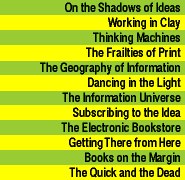


Dancing in the Light
Electronic books have already become a part of the book market. Yet some publishers still resist them because making their books electronic makes it harder to ensure that they aren't illegally copied.Traditionally, publishers and authors have used copyright and the courts to protect themselves. So it would be only natural for publishers to adapt to the new electronic technology by trying to copy-protect their books. Copy protection is like putting a lock on each copy, then selling a key with each locked book. Both software and video producers tried---and recording artists are still trying---to protect their products in this way. If you copy-protect your product, they reasoned, you can charge whatever you want for each copy. It sounds great. But it didn't work.
Intellectual properties like books and movies and songs aren't the same as tangible properties---like ham sandwiches---or rights like franchises, licenses, water rights, stock futures, or airline routes. Often, copy protection merely feeds lawyers and annoys valid users; certainly it adds expense and works against easy searching and comparison. But it seems unavoidable. Or is it?
The information in books is freely accessible; that ease of information exchange makes modern civilization go. Yet paper technical books aren't easy for readers to search, cross-reference, reindex, or carry around in bulk. Suppose, for instance, that you're reading this book on paper and want, right now, to find all other books like it, compare it with ten others, talk to others who've read it, or find discussions of similar books. Well, you can't. At least, not easily---or cheaply.
So if there were some way for publishers to make their books cheap, electronic, and unprotected, it would increase information production, comparison, linkage, and dissemination. Which would benefit us all. The problem, however, is copying.